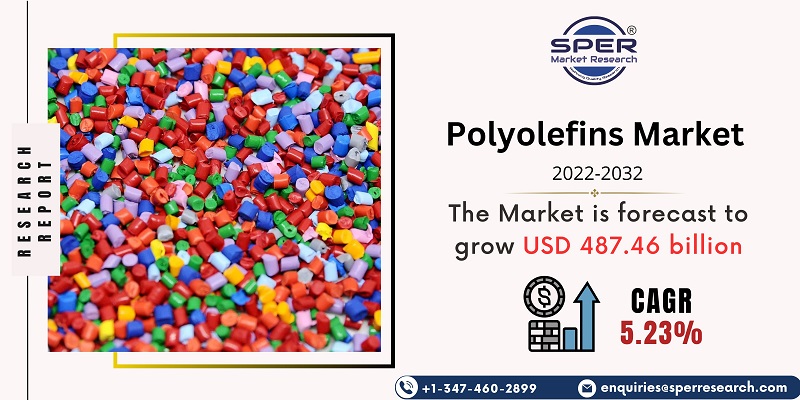
Polyolefins Market Growth, Size, Revenue, Trends, Competition, Challenges and Future Outlook
Polyolefins Market Size- By Type, By Application- Regional Outlook, Competitive Strategies and Segment Forecasts to 2032
| Published: Feb-2023 | Report ID: CHEM2323 | Pages: 1 - 228 | Formats*: |
| Category : Chemical & Materials | |||
- November 2022: Stavian Quang Yen Petrochemical, Ltd. chose LyondellBasell's polypropylene (PP) technology for a new large-scale production site. The facility will house a 600-kiloton-per-year PP plant utilizing LyondellBasell's Spheripol technology, marking their first polyolefin venture together.
- August 2022: SABIC SK Nexlene, a collaboration between SABIC and SK Geo Centric, revealed plans to expand its production facility in Ulsan, South Korea. This expansion, set to begin operations in Q2 2024, aims to address the increasing need for NEXLENE-based polyolefin solutions across diverse industries.
-007063517022023.jpg)

| Report Metric | Details |
| Market size available for years | 2019-2032 |
| Base year considered | 2021 |
| Forecast period | 2022-2032 |
| Segments covered | By Type, By Application |
| Regions covered | Asia-Pacific, Europe, Middle East and Africa, North America, Latin America |
| Companies Covered | Borealis AG, Braskem, Chevron Corp., Dow, Exxon Mobil Corp., LyondellBasell Industries Holdings B.V., PetroChina Company Ltd., Repsol, Sinopec Corp., TotalEnergies |
- Automotive Industry
- Construction Industry
- Consumer Goods Manufacturers
- Environmental and Sustainability Organizations
- Manufacturers and Producers
- Packaging Industry
- Recycling and Waste Management Companies
- Research and Development Professionals
- Suppliers of Raw Materials
- Others
| By Type: |
|
| By Application: |
|
- Global Polyolefins Market Size (FY’2023-FY’2032)
- Overview of Global Polyolefins Market
- Segmentation of Global Polyolefins Market By Type (Ethylene-Vinyl Acetate, Polyethylene, Polypropylene, Polystyrene, Others)
- Segmentation of Global Polyolefins Market By Application (Blow Molding, Film & Sheet, Injection Molding, Profile Extrusion, Others)
- Statistical Snap of Global Polyolefins Market
- Expansion Analysis of Global Polyolefins Market
- Problems and Obstacles in Global Polyolefins Market
- Competitive Landscape in the Global Polyolefins Market
- Impact of COVID-19 and Demonetization on Global Polyolefins Market
- Details on Current Investment in Global Polyolefins Market
- Competitive Analysis of Global Polyolefins Market
- Prominent Players in the Global Polyolefins Market
- SWOT Analysis of Global Polyolefins Market
- Global Polyolefins Market Future Outlook and Projections (FY’2023-FY’2032)
- Recommendations from Analyst
1.1. Scope of the report1.2. Market segment analysis
2.1 Research data source
2.1.1 Secondary data2.1.2 Primary data2.1.3 SPER’s internal database2.1.4 Premium insight from KOL’s
2.2 Market size estimation
2.2.1 Top-down and Bottom-up approach
2.3 Data triangulation
4.1. Driver, Restraint, Opportunity and Challenges analysis
4.1.1 Drivers4.1.2 Restraints4.1.3 Opportunities4.1.4 Challenges
4.2. COVID-19 Impacts of the Global Polyolefins Market
5.1. SWOT analysis
5.1.1 Strengths5.1.2 Weaknesses5.1.3 Opportunities5.1.4 Threats
5.2. PESTEL analysis
5.2.1 Political landscape5.2.2 Economic landscape5.2.3 Social landscape5.2.4 Technological landscape5.2.5 Environmental landscape5.2.6 Legal landscape
5.3. PORTER’S five forces analysis
5.3.1 Bargaining power of suppliers
5.3.2 Bargaining power of Buyers5.3.3 Threat of Substitute5.3.4 Threat of new entrant5.3.5 Competitive rivalry
5.4. Heat map analysis
6.1 Global Polyolefins Manufacturing Base Distribution, Sales Area, Product Type6.2 Mergers & Acquisitions, Partnerships, Product Launch, and Collaboration in Global Polyolefins Market
7.1 Ethylene-Vinyl Acetate7.2 Polyethylene7.3 Polypropylene7.4 Polystyrene7.5 Others
8.1 Blow Molding8.2 Film & Sheet8.3 Injection Molding8.4 Profile Extrusion8.5 Others
9.1 Global Polyolefins Market and Market Share by Region (2019-2025)9.2 Global Polyolefins Market and Market Share by Region (2026-2032)9.3 Asia-Pacific
9.3.1 Australia
9.3.2 China9.3.3 India9.3.4 Japan9.3.5 South Korea9.3.6 Rest of Asia-Pacific
9.4 Europe
9.4.1 France9.4.2 Germany9.4.3 Italy9.4.4 Spain9.4.5 United Kingdom9.4.6 Rest of Europe
9.5 Middle East and Africa
9.5.1 Kingdom of Saudi Arabia9.5.2 United Arab Emirates9.5.3 Rest of Middle East & Africa
9.6 North America
9.6.1 Canada9.6.2 Mexico9.6.3 United States
9.7 Latin America
9.7.1 Argentina9.7.2 Brazil9.7.3 Rest of Latin America
10.1 Borealis AG
10.1.1 Company details10.1.2 Financial outlook10.1.3 Product summary10.1.4 Recent developments
10.2 Braskem
10.2.1 Company details10.2.2 Financial outlook10.2.3 Product summary10.2.4 Recent developments
10.3 Chevron Corp.
10.3.1 Company details10.3.2 Financial outlook10.3.3 Product summary10.3.4 Recent developments
10.4 Dow
10.4.1 Company details10.4.2 Financial outlook10.4.3 Product summary10.4.4 Recent developments
10.5 Exxon Mobil Corp.
10.5.1 Company details10.5.2 Financial outlook10.5.3 Product summary10.5.4 Recent developments
10.6 LyondellBasell Industries Holdings B.V.
10.6.1 Company details10.6.2 Financial outlook10.6.3 Product summary10.6.4 Recent developments
10.7 PetroChina Company Ltd.
10.7.1 Company details10.7.2 Financial outlook10.7.3 Product summary10.7.4 Recent developments
10.8 Repsol
10.8.1 Company details
10.8.2 Financial outlook10.8.3 Product summary10.8.4 Recent developments
10.9 Sinopec Corp.
10.9.1 Company details10.9.2 Financial outlook10.9.3 Product summary10.9.4 Recent developments
10.10 TotalEnergies
10.10.1 Company details10.10.2 Financial outlook10.10.3 Product summary10.10.4 Recent developments
SPER Market Research’s methodology uses great emphasis on primary research to ensure that the market intelligence insights are up to date, reliable and accurate. Primary interviews are done with players involved in each phase of a supply chain to analyze the market forecasting. The secondary research method is used to help you fully understand how the future markets and the spending patterns look likes.
The report is based on in-depth qualitative and quantitative analysis of the Product Market. The quantitative analysis involves the application of various projection and sampling techniques. The qualitative analysis involves primary interviews, surveys, and vendor briefings. The data gathered as a result of these processes are validated through experts opinion. Our research methodology entails an ideal mixture of primary and secondary initiatives.



Frequently Asked Questions About This Report
PLACE AN ORDER
Year End Discount
Sample Report
Pre-Purchase Inquiry
NEED CUSTOMIZATION?
Request CustomizationCALL OR EMAIL US
100% Secure Payment






Related Reports
Our Global Clients
Our data-driven insights have influenced the strategy of 200+ reputed companies across the globe.




















